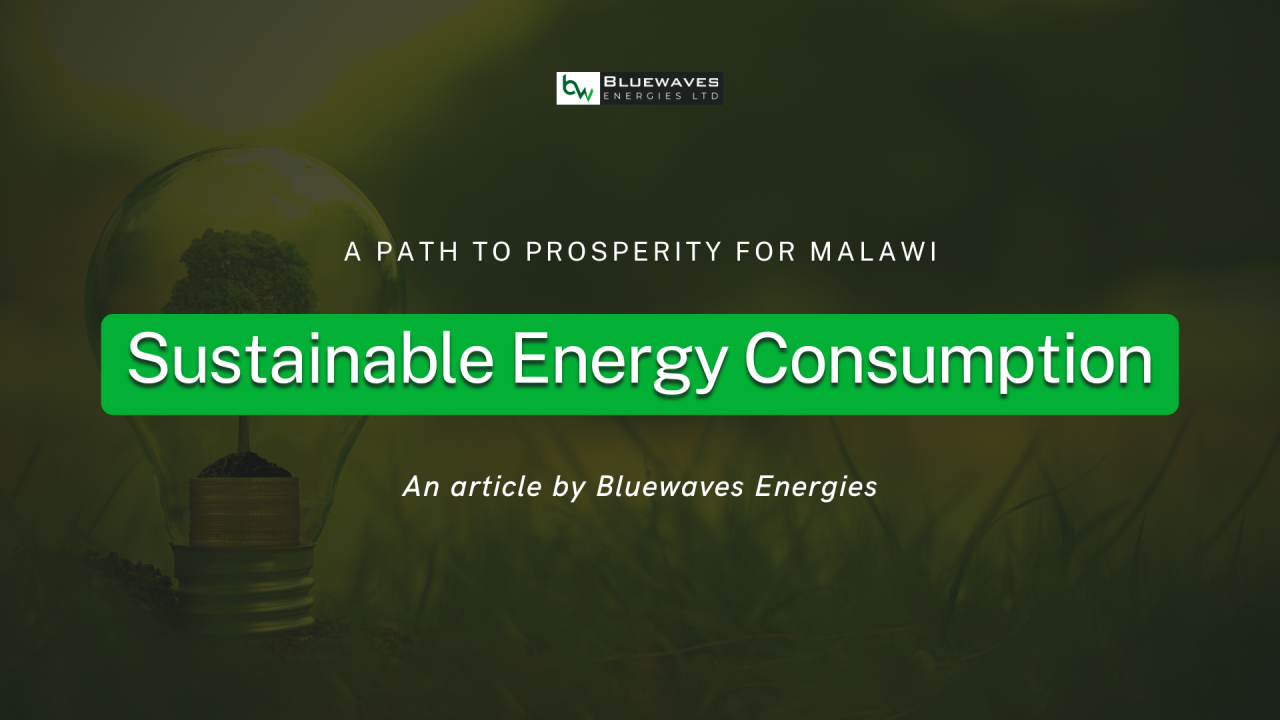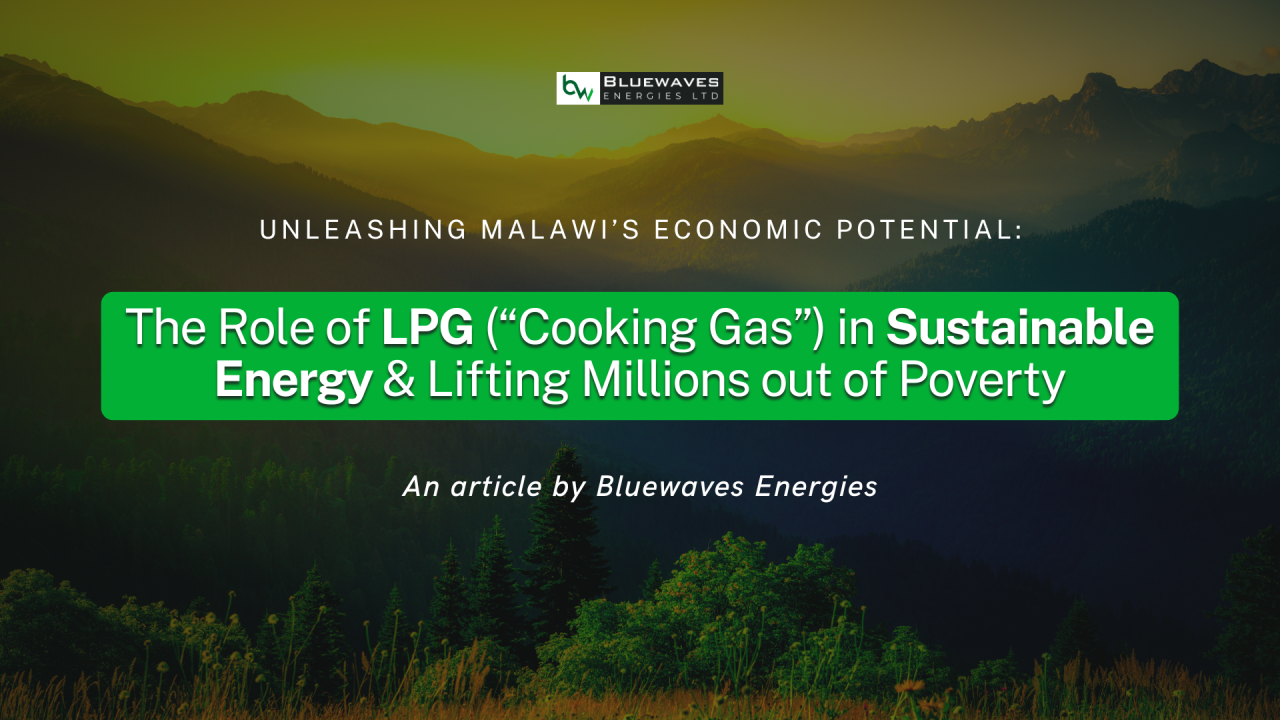Sustainable energy consumption is pivotal to ensuring both environmental stewardship and economic growth. For Malawi, where energy poverty and dependence on traditional biomass are pressing challenges, adopting sustainable energy practices could drive positive change. This article explores actionable strategies for Malawi to transition to sustainable energy sources like solar and wind power, adopt alternative fuels like liquefied petroleum gas (LPG), and improve energy efficiency. By delving into global best practices and offering specific recommendations for implementation, Malawi can make substantial strides toward energy security and economic resilience.
Understanding Sustainable Energy Consumption
Defining Sustainable Energy
Sustainable energy refers to practices that fulfill present energy needs without compromising future generations' ability to meet theirs. According to the UCLA Sustainability Initiative, sustainability emphasizes a balance among ecological health, economic vitality, and social well-being. In the context of energy consumption, this involves:
- Renewable Energy Sources: Utilizing solar, wind, and hydropower that replenish naturally.
- Energy Efficiency: Employing technologies that reduce energy waste, enhancing overall efficiency.
- Circular Economy: Minimizing waste and maximizing resource reuse, which aligns with global goals for reducing carbon emissions and preserving resources.
Benefits of Sustainable Energy Practices
- Environmental Benefits: Reduced greenhouse gas emissions, less pollution, and a lower carbon footprint, which contribute to ecosystem health and biodiversity.
- Economic Benefits: Job creation in new energy sectors, reduced energy costs, and increased economic stability.
- Social Equity: Enhanced access to reliable energy can help address disparities, improve living conditions, and drive inclusive growth.
Malawi’s Energy Context: Challenges and Opportunities
Current Energy Consumption Practices
Malawi's energy consumption is predominantly reliant on biomass, particularly for cooking and heating. Approximately 89% of the population lacks access to electricity, with rural areas being most affected. Heavy biomass dependence leads to deforestation and poses serious health risks from indoor air pollution.
Potential for Sustainable Alternatives
Malawi’s geography and climate make it highly suitable for solar and hydropower development. The country receives substantial sunlight, offering a viable opportunity for solar energy projects, while rivers and lakes could support small-scale hydropower initiatives. Additionally, LPG adoption could serve as an immediate and effective alternative to biomass for cooking, improving air quality and reducing environmental degradation.
Global Best Practices in Sustainable Energy Consumption
Renewable Energy Adoption
Countries like Kenya and Ghana have successfully diversified their energy mix through renewable sources. Kenya’s focus on geothermal energy has reduced dependence on fossil fuels, providing consistent electricity. In Ghana, widespread LPG adoption for cooking has reduced deforestation and improved air quality. Malawi can draw from these examples by:
- Developing Renewable Energy Projects: Initiating large- and small-scale solar projects to power both urban and rural communities.
- Subsidizing LPG for Households: Providing financial incentives to make LPG affordable and accessible, particularly in rural areas.
Efficient Energy Use and Smart Grid Technology
Energy efficiency and smart grids can significantly reduce energy waste:
- Smart Meters and Automated Systems: These technologies optimize electricity distribution, balancing supply with demand. For Malawi, incorporating smart meters could reduce electricity theft and improve billing accuracy, making energy management more reliable.
- Improving Building Efficiency: Implementing energy-efficient designs and retrofitting existing buildings with better insulation and lighting can drastically lower energy use.
Alternative Fuels: The Role of LPG
LPG adoption can directly reduce reliance on wood and charcoal, which are primary causes of deforestation and health issues. Transitioning to LPG requires:
- Creating Awareness Programs: Educating communities about the benefits of LPG and safe usage practices.
- Establishing LPG Supply Chains: Working with private sector partners to ensure reliable LPG availability, even in remote areas.
Benefits of Sustainable Energy for Malawi
Economic Growth and Job Creation
Adopting sustainable energy can stimulate local economies by creating jobs across various sectors:
- Solar Panel Installation and Maintenance: Local training programs can equip individuals with skills needed for jobs in solar panel installation and repair.
- Entrepreneurship Opportunities: Small businesses can emerge to provide services around renewable energy, such as solar battery sales, installation, and maintenance.
Enhanced Energy Security
A diverse energy portfolio would decrease Malawi's vulnerability to fuel price fluctuations and external supply chain disruptions. By investing in renewables, Malawi could achieve greater self-sufficiency and reliability in energy.
Environmental Protection and Public Health
Reduced deforestation and lower emissions have direct public health benefits. By transitioning from biomass to LPG, for instance, Malawi can mitigate respiratory diseases linked to indoor air pollution, leading to improved quality of life for its citizens.
Actionable Recommendations for Stakeholders
Government Initiatives
- Policy Frameworks and Incentives: The government should establish clear policies that encourage renewable energy investment, such as tax breaks and subsidies for solar and wind energy projects. These incentives can make it more attractive for local and international companies to invest in renewable energy in Malawi. The country can also implement net metering policies, where households with solar panels can sell excess energy back to the grid, creating a financial incentive for individuals to invest in renewable energy.
- Public-Private Partnerships: Government partnerships with private companies can help with the large capital investment required for sustainable energy projects. For example, the government could collaborate with solar power companies to establish mini-grids in rural areas, sharing both costs and profits. Engaging international development agencies to co-fund projects with local businesses can also provide technical expertise and financial support.
- Building Investor Confidence: Malawi can highlight its renewable energy potential at international forums and through targeted investment pitches. Offering long-term concessions and securing transparent, stable regulatory frameworks will attract foreign investors, particularly from countries looking to diversify into green energy markets. Establishing agencies or departments dedicated to renewable energy can streamline processes for investors, making it easier for them to navigate local regulations and invest in Malawi’s energy sector.
Community and Business Engagement
- Awareness Campaigns and Training Programs: Conduct workshops to educate communities on renewable energy benefits and practical aspects, like maintaining solar panels or safely using LPG. This education can empower individuals and increase local support for sustainable practices. Partnering with NGOs to provide hands-on training in renewable energy technology installation and maintenance can help cultivate a skilled workforce ready to support and sustain renewable energy projects.
- Encouraging Local Business Involvement: Malawi can provide incentives for small and medium-sized enterprises to invest in energy efficiency improvements or adopt renewable energy. For instance, grants could be offered to businesses that commit to using solar power. Local entrepreneurs can also be encouraged to explore business opportunities around sustainable energy, such as setting up local shops selling solar home systems or LPG equipment, contributing to local economic growth and energy access.
International Cooperation and Investment
- Leveraging International Funding and Expertise: Malawi can apply for grants and technical support from international organizations focused on sustainable development, like the World Bank or the African Development Bank. These organizations offer both financial resources and technical expertise to help developing countries implement sustainable energy projects.
- Learning from Successful Regional Models: Forming partnerships with countries like Kenya and Ghana that have successfully implemented sustainable energy practices can enable Malawi to adapt and tailor these models to its unique context. For example, Malawi could invite Kenyan experts to provide guidance on establishing mini-grids for rural electrification, leveraging Kenya's experience in building a robust off-grid solar network. Malawi could also join regional alliances focused on renewable energy to facilitate information sharing, technical assistance, and coordinated policy efforts to drive sustainable energy adoption across the region.
Conclusion
By committing to sustainable energy practices, Malawi can pave the way towards a resilient, prosperous, and environmentally sound future. Adopting renewable energy sources, promoting alternative fuels like LPG, and improving energy efficiency will require the coordinated efforts of government, businesses, and communities. However, with a clear roadmap and actionable steps, Malawi can unlock the full potential of sustainable energy to drive economic growth, reduce energy poverty, and protect the environment.
Now is the time for Malawi’s leaders, businesses, and citizens to champion sustainable energy as a means to ensure long-term prosperity. Through collaborative action and informed policy, Malawi can set a compelling example for other nations in the region, demonstrating that sustainable energy is not just an environmental imperative but a pathway to enduring economic and social benefits.



